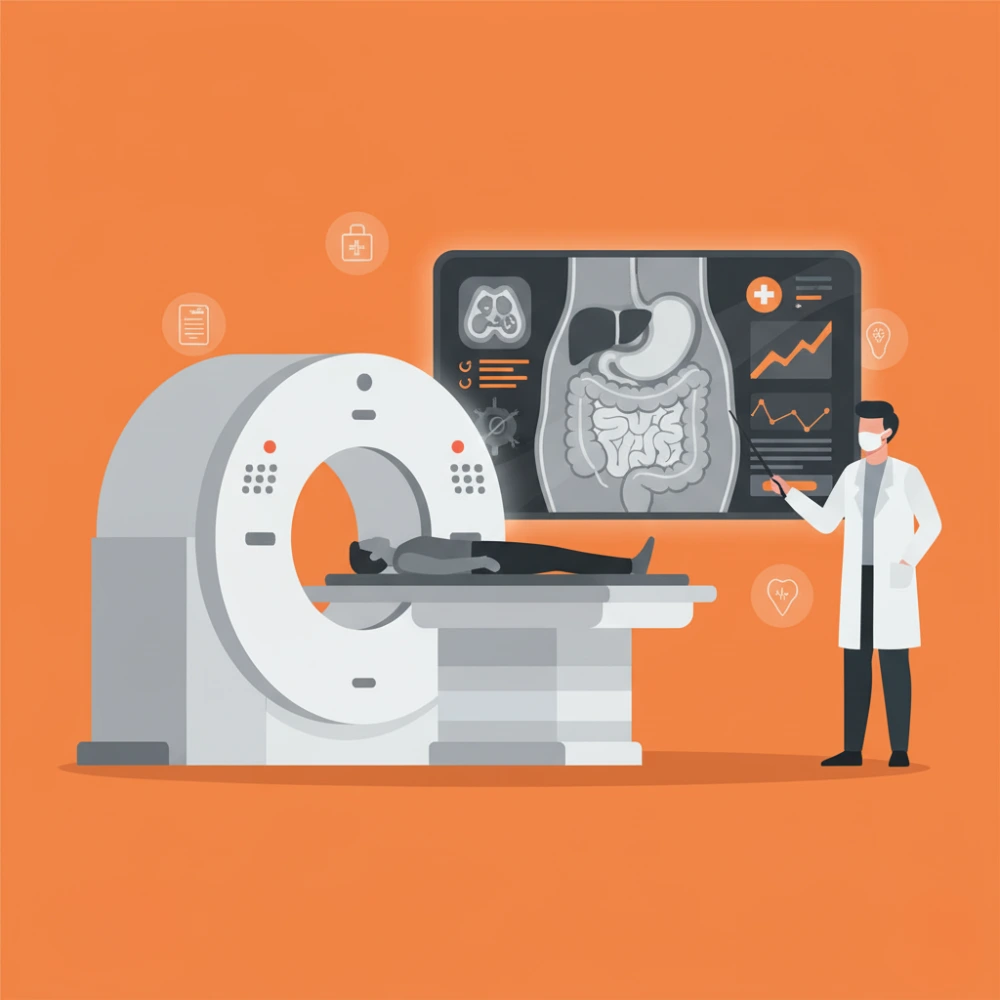
CT KUB Scan – Accurate, Advanced & Comprehensive Imaging
At Akshar Imaging Centre, we provide advanced CT KUB (Kidneys, Ureters, and Bladder) Scan services using the latest multidetector CT technology. Our scans produce high-resolution, cross-sectional 3D images of the kidneys, ureters, bladder, and surrounding abdominal structures, allowing urologists, nephrologists, and physicians to accurately diagnose kidney stones, urinary tract obstructions, infections, tumors, congenital anomalies, and other urinary system conditions.
A CT KUB Scan is a safe, non-invasive, and painless diagnostic imaging test. Compared to conventional X-rays or ultrasound, it provides far more detailed information, making it the preferred choice for evaluating the urinary tract, renal system, and related abdominal structures.
What Is a CT KUB Scan?
A CT KUB Scan uses advanced computed tomography to capture thin-slice, high-resolution images of the kidneys, ureters, and bladder along with surrounding organs and blood vessels. It helps doctors detect kidney stones, ureteral calculi, bladder stones, tumors, cysts, urinary tract obstructions, infections, and congenital abnormalities. This scan is essential for accurate diagnosis, treatment planning, and surgical guidance.
Why It’s Performed / Common Indications
- Unexplained or severe flank or abdominal pain
- Suspected kidney stones, ureteric stones, or bladder stones
- Evaluation of urinary tract infections or recurrent infections
- Detection of tumors, cysts, or masses in kidneys, ureters, or bladder
- Assessment of congenital urinary tract abnormalities
- Monitoring post-surgical or post-procedure conditions in the urinary system
- Preoperative planning for urological surgery
- Investigation of hematuria (blood in urine) or urinary obstruction
- Evaluation of trauma or injury to the renal system
Preparation
- Usually, no special preparation is required.
- You may be asked to fast for a few hours if contrast dye is needed.
- Remove jewelry, watches, or metallic objects from the abdominal and pelvic area.
- Wear comfortable clothing or a gown for the scan.
- Inform the technologist if you are pregnant or suspect pregnancy, as CT scans involve radiation.
- Disclose any allergies, kidney issues, or prior contrast reactions if contrast dye is planned.
Procedure
- You will lie down on the CT scanner table, which slowly moves into the machine.
- The scanner rotates around your abdomen and pelvis to capture thin-slice, high-resolution images.
- You may be asked to hold your breath for a few seconds to avoid motion blur.
- If contrast dye is required, it will be administered via an IV line.
- The scan itself takes only a few minutes; the entire process usually lasts 10–15 minutes.
What Happens Next (Interpretation)
A radiologist carefully reviews the CT KUB images to evaluate:
- Presence of kidney stones, ureteric stones, or bladder stones
- Abnormalities in kidneys, ureters, bladder, or adjacent structures
- Tumors, cysts, or masses in the urinary system
- Signs of infection, obstruction, or inflammation
- Trauma-related injuries to the urinary tract
- Blood vessels and lymph nodes in the abdomen and pelvis
Benefits vs. Risks
Benefits:
- Provides highly detailed 3D imaging of the urinary system
- Detects kidney stones, obstructions, and tumors missed by X-rays or ultrasound
- Essential for diagnosis, monitoring, and preoperative evaluation
- Quick, accurate, and non-invasive diagnostic tool
Risks:
- Involves a small dose of radiation (minimized with modern CT scanners)
- Rare risk of allergic reaction if contrast dye is used
- Generally not recommended during pregnancy unless medically necessary
Why Choose Akshar Imaging Centre
- Advanced multidetector CT scanner for precise KUB imaging
- Experienced radiologists specialized in urology and nephrology diagnostics
- Comfortable, patient-friendly environment with minimal wait times
- Fast and reliable report delivery for timely treatment
- Convenient location in Ahmedabad with easy scheduling options
Frequently Asked Questions (FAQs)
1. Is a CT KUB Scan safe?
Yes. It involves low radiation exposure and is very safe. Extra precautions are taken for children and pregnant women.
2. How long does the scan take?
The scan itself takes only a few minutes; the full appointment usually lasts 10–15 minutes.
3. Why has my doctor advised this test?
It may be to detect kidney or urinary stones, tumors, infections, obstructions, or for preoperative planning.
4. Do I need contrast dye for this scan?
Contrast is used only if your doctor requires enhanced imaging of organs, blood vessels, or specific tissues.
